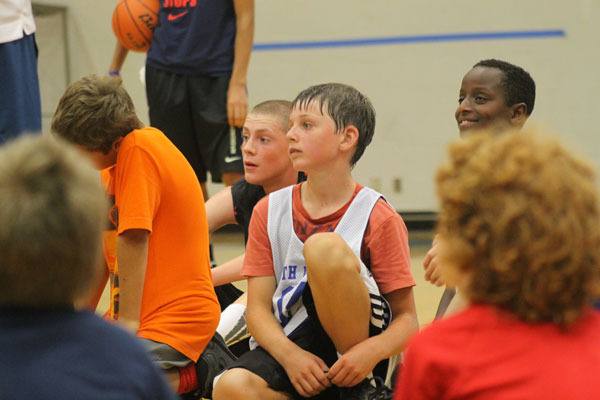If there’s one thing in life that makes Michael Washington a happy person and a happy coach it’s an abundance of players turning out to shoot some hoops.
It’s a good thing, then, that 37 kids registered for the Falcon boys basketball camp, which began Monday and runs through Thursday. The camp, open to grades three through eight, is designed to build skills, stay active over summer break, and prepare for the basketball season.
Under the guidance of Washington, South Whidbey High School’s boys basketball head coach, and some of the Falcon players, the participants drilled and scrimmaged and had some fun along the way.
“I really enjoyed it,” said 11-year-old Ryan Morgan. “(Washington) knows a lot about basketball. We learned how to close on the defender and find good shots.”
During Monday’s two-hour session, the players were split up into two groups designated by age and skill-level.
The more advanced group, designated as “Division I” players, learned how to screen and roll, play man-to-man defense and execute close-out drills.
The younger players, named “Division II,” focused on ball-handling, one-on-one moves, pass-and-screens, jump balls and layups.
At the conclusion of the first hour, the players were broken up into teams, named in accordance to their division level, such as Washington State or Seattle Pacific, and scrimmaged in 25-minute, running-clock games.
“They gain some skill, they gain some identity of what the high school program is about, and they learn about each other,” Washington said. “They get better, they get in the gym, they’re playing and I’m seeing who we have coming up the pipe.”
Falcon senior small forward Chase White, who coaches the “Washington State” team, felt splitting the participants by skill-level could have lasting impacts on the development of the players.
“It makes it a lot easier for players of the same skill level to develop because if a really good player is not playing against other really good players, he doesn’t get to experience a full development of his game,” White said. “I think playing players of the same tier of skill level is a really good idea.”
It also lifts the mood of the regular summer drills that White said used to be a “drag” when he participated in them, to a purposeful and competitive environment. But most importantly, Washington just wants the kids to enjoy their time in the gym.
“I want to have it be fun for the kids so that the parents will bring them back,” Washington said.
While the camp is primarily a way of building the skills and foundations of the players, there’s a much more crucial motive behind the scenes for Washington, which could have lasting impacts on the future and prominence of the program years down the road.
Last year, Washington was saddened by the small turnout of the boys basketball program at the high school. And even then, some of the players still had much to learn.
“I had kids who didn’t even know what jumping to the ball meant or what help defense meant,” Washington said. “And these are some of my varsity basketball players. It’s like, ‘Wow.’ ”
The key, Washington says, is getting the kids out playing early on. In order to build their skills, there must be a foundation to work with. That’s why Washington coordinated an Amateur Athletic Union (AAU) team last year, which allows athletes to travel and compete around the state. Running youth clinics and offseason basketball programs will keep basketballs in the hands of the athletes and their skills consistently improving. The eventual vision is to have several AAU teams, where Washington can install his own plays that he runs at the high school, so when the kids reach the ninth grade, they’ll hit the ground running.
“I want to be able to have a fifth-grade, sixth-grade, seventh-grade, eighth-grade select team and I want there to be an abundance of kids — maybe 10, 12 kids per team — so that once they get in high school, now we have kids who have played, and have played other people rather than against each other, and maybe have some success,” Washington said.
“If we can teach them the principles so once they get to the high school level we can just refine — refine instead of always having to teach — in the long run, it will be a lot better for us as a program.”



